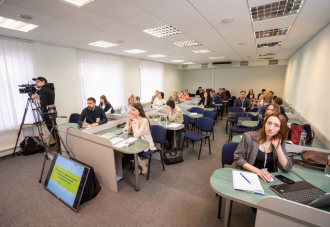On November 26, 2021, an expert discussion “Complications in the activities of Ukrainian NPOs as a result of primary financial monitoring by banks” took place in Kyiv. It was organized (online) by the Centre for Democracy and Rule of Law as part of the Ukraine Civil Society Sectoral Support Activity.
The discussion took place as part of a series of public events aimed at discussing the fight against money laundering and terrorism financing and its impact on the activities of NPOs in Ukraine. After all, such measures can have a negative impact on non-profit organizations (NPOs). In particular, the problem is that states often introduce over-regulation of NPO’s financial transactions.
International experts in the field of legal regulation of CSOs (Liuben Panov, European Center for Not-for-Profit Law), Council of Europe Representative in Ukraine Serhii Rybchenko, representatives of banking institutions (Ukreximbank, Privatbank, Oschadbank) and civil society organizations joined the discussion.

The following aspects of the impact of primary financial monitoring measures on CSO activities were discussed:
- Key problems of non-profit organizations (NPOs) arising from banks’ primary financial monitoring. They were mentioned by the discussion participants during registration.
The most common problems according to them include annual re-identification of customer data, long and complicated procedure of opening an account, problems associated with funds blocking in accounts and refusal to open an account. Also, frequently asked questions included questions about unaccounted specifics of the legislation governing the activities of NPOs – such as the difference between the founders, participants and members of the governing bodies of the public association. Difficulties also arise with sending SWIFT payments and over-regulation of NPO financial transactions.
- An overview of the MoneyVal report for Ukraine 2017 on the risk assessment of NPO transactions during the initial financial monitoring was presented.
Serhii Rybchenko, coordinator of the Council of Europe’s project “Strengthening Measures to Counter Money Laundering and Financing of Terrorism in Ukraine”, explained in detail why NPOs in Ukraine are classified as objects of enhanced financial monitoring. They include, in particular, the results of the National Risk Assessment conducted in 2019. Mr. Rybchenko called on NPOs to offer their assistance and participation in the next round of the National Risk Assessment in 2022.
- The impact of money laundering legislation on the activities of NPOs in European countries was discussed. The minimum necessary measures to ensure compliance with FATF recommendations were outlined.
Liuben Panov, an expert at the European Center for Non-Profit Law, said that as part of FATF Recommendation 8 “Non-Profit Organizations” countries should analyze compliance with the laws and regulations concerning non-profit organizations that the country considers vulnerable to abuse in terrorism financing. States should apply targeted and proportionate measures to such non-profit organizations (according to their risk-based approach) to protect them from abuse in terrorism financing. The expert also noted the opportunities for CSOs to join the activities of the Global NPO Coalition on FATF – www.fatfplatform.org and other opportunities for CSOs to interact with the FATF.
- The approach to the implementation of primary financial monitoring of NPOs in the activities of Ukreximbank was presented.
The Ukreximbank representative noted the application of enhanced monitoring measures to NPOs, which is required in particular by the approaches approved by the Resolution of the National Bank of Ukraine No. 65 of 05/19/2020 “On the Approval of the Regulation on Financial Monitoring by Banks”. At the same time, the bank’s representative noted the practice of applying control measures only to the extent necessary, taking into account the nature of the activities of organizations, their type, etc.
In addition, the participants shared practical cases of the impact of financial monitoring measures on the operational activities of organizations and received feedback from the representatives of banking institutions.
The expert discussion participants made the below conclusions:
- The need to continue the ongoing dialogue between CSOs and banks in the future, organizing thematic discussions to address specific issues;
- The need to establish cooperation with the state regulators (NBU, State Financial Monitoring Service of Ukraine), in particular, through the involvement of CSOs in the National Risk Assessment in 2022;
- The expediency of considering joining the Global NPO Coalition on FATF.
The expert discussion “Complications in the activities of Ukrainian NPOs as a result of primary financial monitoring by banks” is part of the project Ukraine Civil Society Sectoral Support Activity, implemented by the Initiative Center to Support Social Action “Ednannia” in consortium with the Ukrainian Center for Independent Political Research (UCIPR) and the Centre for Democracy and Rule of Law (CEDEM) with the sincere support of the American people through United States Agency for International Development (USAID).



